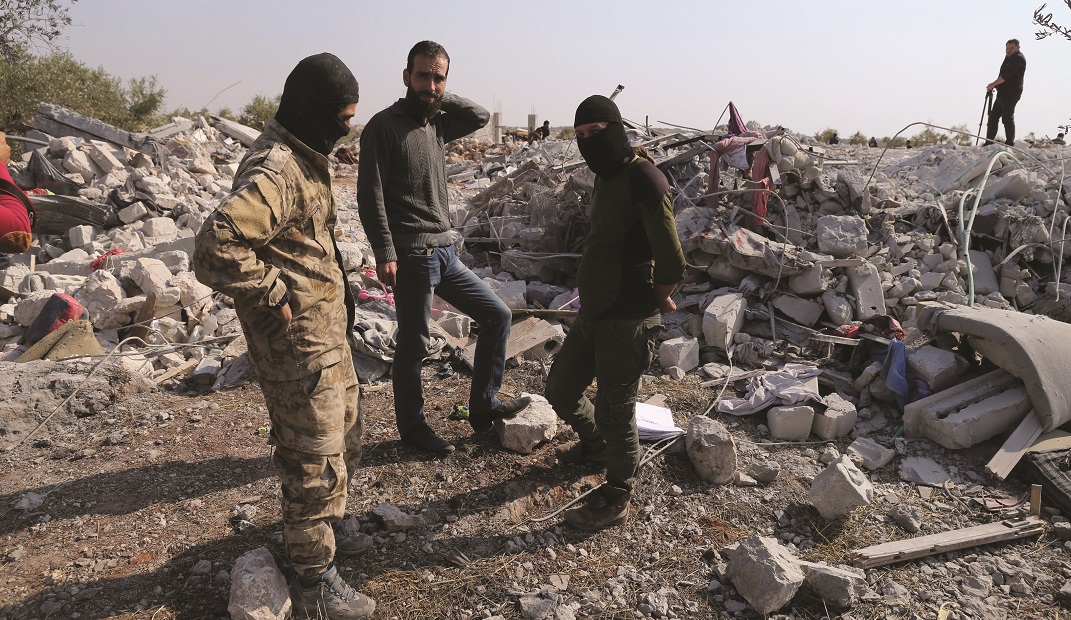Al-Baghdadi Is Dead, but Islamic State Lives

What Baghdadi's death means for ISIS

Photo: AP Images
The assassination of Islamic State leader Abu Bakr al-Baghdadi is unlikely to significantly affect the organization’s activities in the Middle East and certainly won’t dampen its thirst for jihad, Israeli security officials told me.
The operation to eliminate al-Baghdadi was complex and bold, comparable to the operation in which US Navy SEALs eliminated Osama bin Laden in Pakistan in May 2011. More than 100 special operations soldiers were ferried in eight helicopters in the middle of the night over hostile areas controlled by terrorist organizations and within range of Russian and Turkish aircraft to land in a remote area of northern Syria.
There, the Americans stunned the Islamic State fighters with their firepower, pursuing al-Baghdadi into a tunnel, where he blew himself up. Not one American soldier was killed in the raid, though two sustained minor injuries. American soldiers were on the ground in Syria for two hours and managed to collect intelligence that will help them combat future operations by Islamic State, also widely known as ISIS.
Al-Baghdadi had succeeded in transforming ISIS, which began as the Iraqi branch of al-Qaeda, into the world’s most powerful terrorist organization. At one point, ISIS controlled 34,000 square miles in Syria and Iraq for more than three years. ISIS ran its caliphate as a state within a state, complete with police forces, laws, and an independent economy based on tax collection and oil trade. The terror group also trafficked in kidnapping and the selling of antiquities. Al-Baghdadi was not only the leader of the organization and the head of state, but also presented himself as a religious authority, relying on his claim that he belonged to the Quraysh tribe of Muhammad, Islam’s founder.
Any attempt to eulogize the terrorist organization would be a complete mistake, analysts say. The terror group has already named a new leader, former Iraqi soldier Abdullah Qardash, and analysts note that ISIS had already become highly decentralized. Al-Baghdadi was so concerned about his safety that he communicated with few people and traveled secretly.
“Baghdadi was surrounded by Iraqis, he didn’t trust anybody else,” said Mike Pregent, a senior Middle East analyst at the Hudson Institute. “A lot of the other ISIS leadership complained that they couldn’t get to Baghdadi because he only trusted a small group of Iraqis.”
Though its leader is gone, Islamic State maintains active and violent branches in several countries across the world. The Sinai Peninsula, India, Nigeria, and the Philippines are just a few places where loosely affiliated ISIS branches continue their terror mission and may try to avenge the death of their leader in the coming days.
Israeli analysts point to the Islamic State force in Sinai as among the most violent and organized of the terror group’s offshoots. Sources described it as an independent branch that draws inspiration from al-Baghdadi but does not receive detailed instructions from ISIS headquarters.
Since President Trump decided to significantly reduce the American troop presence in Syria, hundreds of ISIS prisoners held by Kurdish groups have escaped. These and other Islamic State sympathizers may now regroup in an attempt to implement al-Baghdadi’s final vision.
—With reporting by Omri Nahmias
(Originally featured in Mishpacha, Issue 783)
Oops! We could not locate your form.













